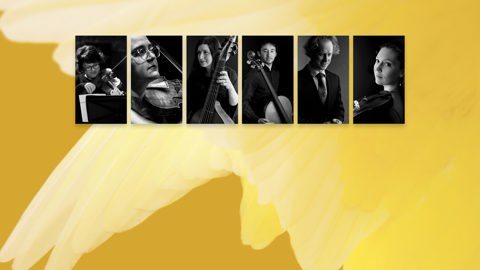By Stephanie Eslake, 2022
For an artist of the 17th Century, Georg Muffat certainly got around. The Baroque composer of Scottish descent was born in Savoy, lived in Vienna, travelled to Prague, and studied in Rome. He crafted German suites in a French style, and concerti grossi in an Italian style.
What might borders have meant to this composer who crossed them in the name of music?
Baroque violinist Julia Fredersdorff considers Muffat a “true musical polyglot”. The composer was at the forefront of her mind when she sat down with Musica Viva Artistic Director Paul Kildea. Together, they imagined a concert program that could go on tour – music they could share across Australia’s own state borders, which for so long had been locked.
“Paul and I realised this idea of borders had suddenly become much more of a talking point, and that exploring the idea of borders or lack thereof – in a musical sense, a compositional sense, as well as a human sense – made for very fertile ground,” Julia says.
Borderlands came to life: together, Musica Viva and Van Diemen’s Band would reconnect Australia through live performance.
Julia founded Van Diemen’s Band in Tasmania. Though her home state has no land borders, the violinist has also spent time in Europe. She would travel from France to the Netherlands for lessons with an Italian teacher, experiencing a continent with “so many radically different cultures jammed in right next to each other”.
So when the pandemic prevented her from travelling across the states of Australia, it felt like a “shock to the system”.
“The pandemic certainly did highlight the feeling of geographical division – something we weren’t used to here.”
We can contemplate division and togetherness through this program. While Muffat was an “obvious choice” to include, other composers – such as Becker, Sainte-Colombe, and Albinoni – reflect the theme philosophically.
“The 17th Century was a time of great instability in Europe. The geopolitical situation would have had a huge impact on the way composers worked, and the context in which their music was written,” Julia explains.
“Each of the composers in this program comes from the extremity of a country – or a port town or land border, or a land which was particularly isolated from the rest of the world.”
Some even “push the extremities of their own art form”. María Huld Markan Sigfúsdottír’s crosses genre and era in her 2013 piece Clockworking. Baroque strings are set to electronic backing, creating a soundscape “as isolated as the geography of her home country of Iceland”.
It’s impossible to overlook the impact of conflict on the evolution of borders. Much of this program traces war and its aftermath; moments that have challenged or strengthened relationships between countries and cultures.
Julia feels major events, such as war and the pandemic, “amplify the need for music”.
“This is a salient reminder that music – especially right now – is the ultimate tool for survival. It gives us a reason to keep going, and it reminds us of our common humanity.”
For this program, Musica Viva Australia commissioned Australian composer Donald Nicolson’s 2022 work Spirals. In light of events in Ukraine, Donald made a “last-minute change” to the piece, weaving an Orthodox prayer into the structure of his composition.
In the composer’s words, it’s an update that “acknowledges the conflicts that we are living through or reading about right now”.
“The concept of Borderlands has suddenly become pertinent as we scroll through our newsfeeds,” Donald says.
Spirals also embeds a musical connection to the theme: Donald was inspired by the passacaglia, a musical form used in European cultures in the 17th and 18th centuries.
“I visualised that bassline as maintaining an ever-presence in our musical consciousness.
“Whether now, or 400 years ago – here in the Southern Hemisphere, or in the countrysides of the European boundaries – the passacaglia has always existed, and continues to exist beyond us.
"Spirals allows us to step away from our immediate surroundings – to pause, to think, to allow our mind to wander, or not; to contemplate or be transported.”
Ahead of its world premiere, Donald recalls how Julia was “clear from the outset” that she wanted original Australian music on this global program. The pair have a history of collaboration; Donald is also a harpsichordist and organist who has crafted other arrangements for Van Diemen’s Band.
In exploring music of the baroque era, as well as the remarkable characteristics of its instruments, Donald feels Van Diemen’s Band is “creating a whole new legacy of original music and sounds”.
“True to the concept, these are the new borderlands of the early music movement. And Julia's assembly of artists presents us with a unique opportunity to hear these musicians performing on the same stage.”
As for crossing local borders on their Musica Viva Australia tour, Julia feels “a sense of hope and joy”.
“This is something a little Tassie band could never have taken the risk on without the support of Musica Viva Australia, and we are so grateful for this opportunity to spread our wings after a long period on the ground!”

